Key takeaways:
- Understanding cancellation policies is crucial for informed decision-making and financial protection, as they vary significantly in terms of flexibility and refund options.
- Key terms like “non-refundable,” “grace period,” and “penalty fee” directly affect financial exposure and planning, making it important to read policies carefully.
- Consumer rights and clarity in cancellation policies are vital legal considerations; companies must balance protective policies for themselves with fair treatment of customers to avoid negative repercussions.

Understanding cancellation policies
Understanding cancellation policies can seem daunting, but they’re designed to protect both you and the service provider. I remember when I had to cancel a much-anticipated trip; reading through the policy helped me navigate the situation without feeling overwhelmed. Have you ever found yourself frantically searching for clarity in a cancellation policy, only to come away more confused?
Some policies have flexible terms, allowing for a full refund if you cancel within a specified time frame. I once booked a hotel that offered a 48-hour window for cancellations, which saved me from losing my money when an unexpected event arose. Isn’t it comforting to know that sometimes, plans can be adjusted without financial loss?
However, not all policies are created equal. I’ve encountered strict non-refundable bookings that left me feeling uneasy, particularly because I hadn’t anticipated needing to cancel. It’s crucial to dissect these policies before committing—what’s the point of a good deal if it comes with stress and uncertainty later on?
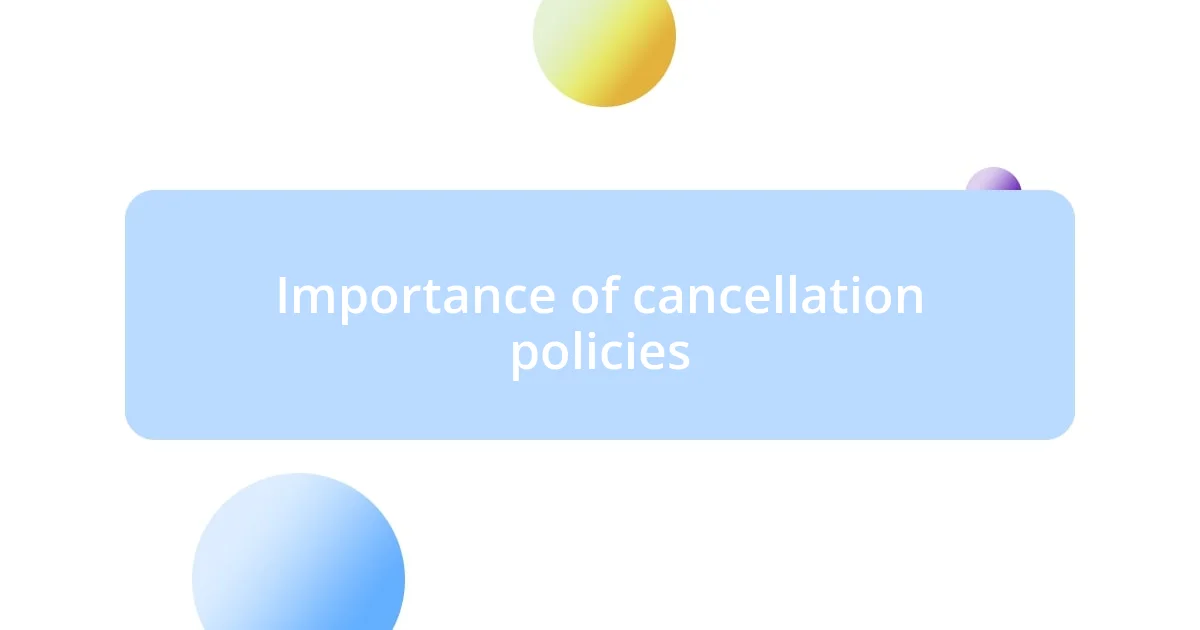
Importance of cancellation policies
Cancellation policies are vital safeguards that not only protect consumers but also help service providers manage demand and resources effectively. I recall a time when a last-minute work commitment clashed with my travel plans, and the clear cancellation policy of that airline allowed me to reschedule without the stress of hefty fees. It’s moments like these that remind me of the peace of mind a well-structured cancellation policy can bring.
Here are a few reasons why cancellation policies hold such importance:
- They encourage responsible planning, enabling you to make informed decisions about your commitments.
- A clear policy can foster trust between consumers and providers, establishing transparency in transactions.
- Flexibility in cancellations can enhance customer satisfaction and loyalty, as it signals understanding and empathy toward unexpected life changes.
- They help service providers balance their bookings, minimizing losses from no-shows while accommodating genuine cancellations.
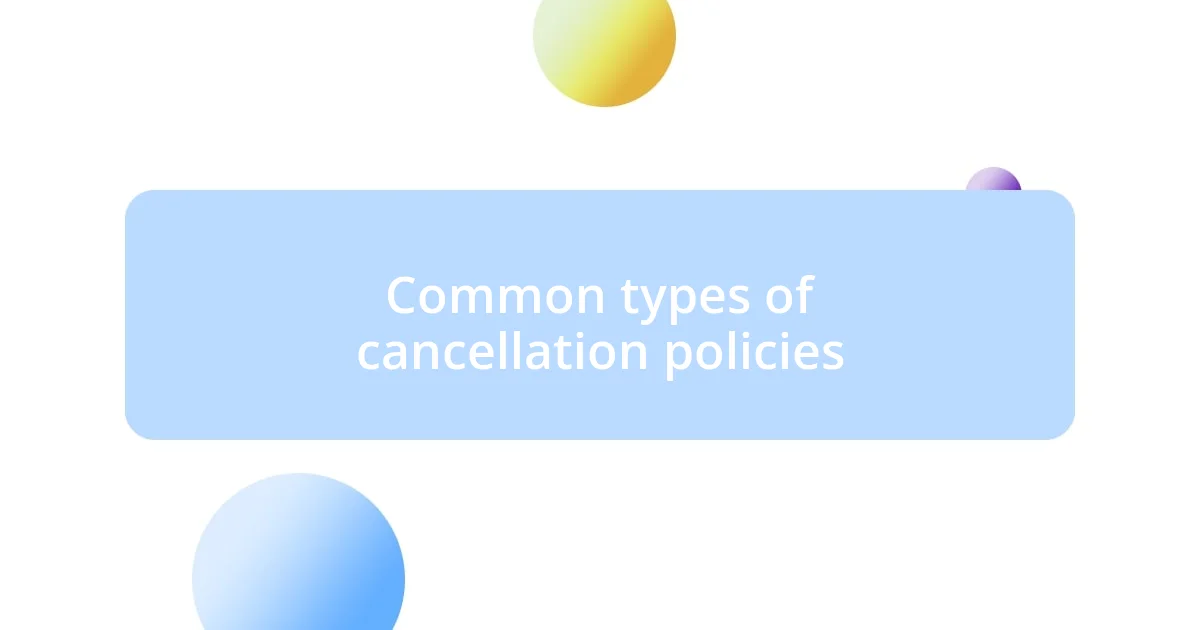
Common types of cancellation policies
The common types of cancellation policies mainly fall into three categories: flexible, moderate, and strict. From my experience, flexible policies have been a blessing—they allow cancellations with little to no penalty, often providing a full refund if you cancel within a specific timeframe. When I had to cancel a weekend getaway, the refund made the situation far less stressful than I anticipated.
In contrast, moderate policies may offer partial refunds or require cancellation within a shorter window. I once faced this situation with a narrow 24-hour cancellation period; thankfully, I managed to change my itinerary just in time. I remember thinking how crucial it was to keep track of those deadlines, as missing them could mean losing money. It’s a balancing act, isn’t it?
Then there are the strict policies, which can be quite daunting. These often come with stringent rules, such as non-refundable fees, making it hard for travelers like myself to navigate unexpected changes. I learned the hard way that reading the fine print on a non-refundable airline ticket was essential; it left me scrambling for alternate solutions when my plans fell through. It’s a stark reminder of why understanding cancellation policies is indeed a must.
| Cancellation Policy Type | Characteristics |
|---|---|
| Flexible | Full refunds or rescheduling allowed within a generous timeframe. |
| Moderate | Partial refunds may be possible, often with specific conditions. |
| Strict | No refunds; leads to financial loss if plans change. |
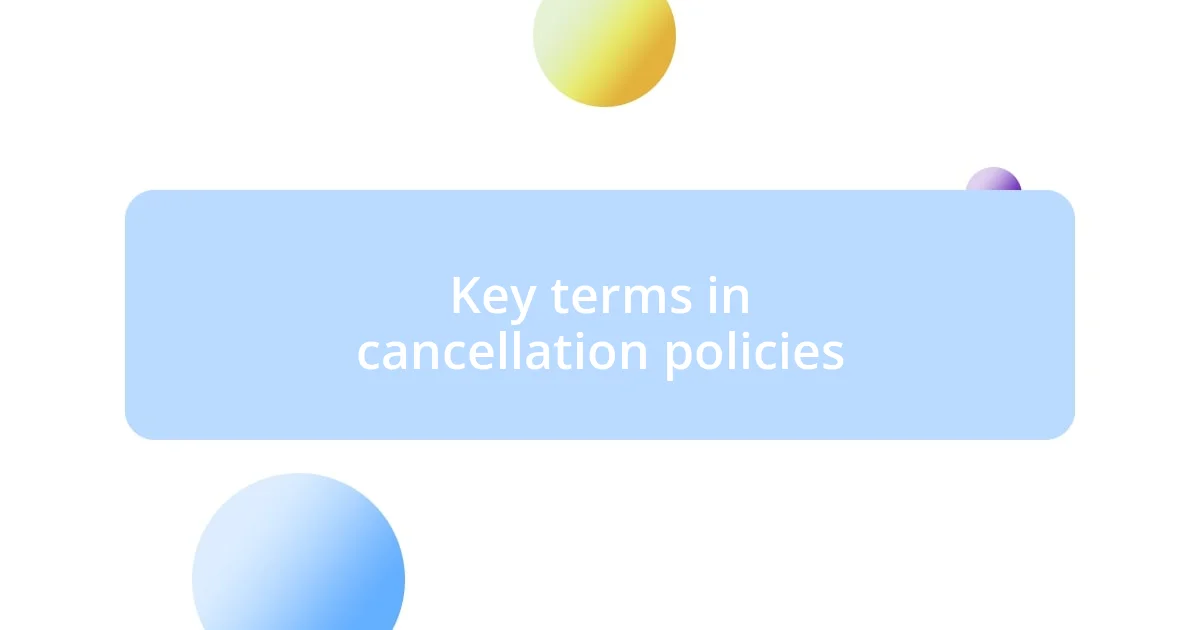
Key terms in cancellation policies
When reviewing cancellation policies, it’s essential to grasp key terms that shape your understanding and expectations. For instance, the term “non-refundable” can evoke anxiety, especially if you’ve been in a situation where plans fell apart unexpectedly. I remember booking a hotel with a non-refundable clause; when a family emergency arose, the financial impact hit hard. Terms like this are crucial to comprehend because they directly affect your financial decisions.
Another term often encountered is “grace period.” This refers to a specific timeframe where cancellations can be made without penalties. I experienced this firsthand when a travel agency offered a 48-hour grace period on a package deal. The relief of knowing I could back out if my plans changed helped me make a more confident decision. Imagine booking something and later realizing you have a conflict; having that grace period can offer a safety net.
Lastly, “penalty fee” is a term that appears frequently in policies, and it can feel like a looming threat. I once faced a hefty penalty fee for cancelling an adventure tour within 48 hours of the start time. Looking at that extra cost made me question whether traveling was worth the risk. Understanding how these terms interact can help inform your choices and guide you in selecting the best policy for your needs. What have you experienced with penalty fees? Your insights may surprise you!
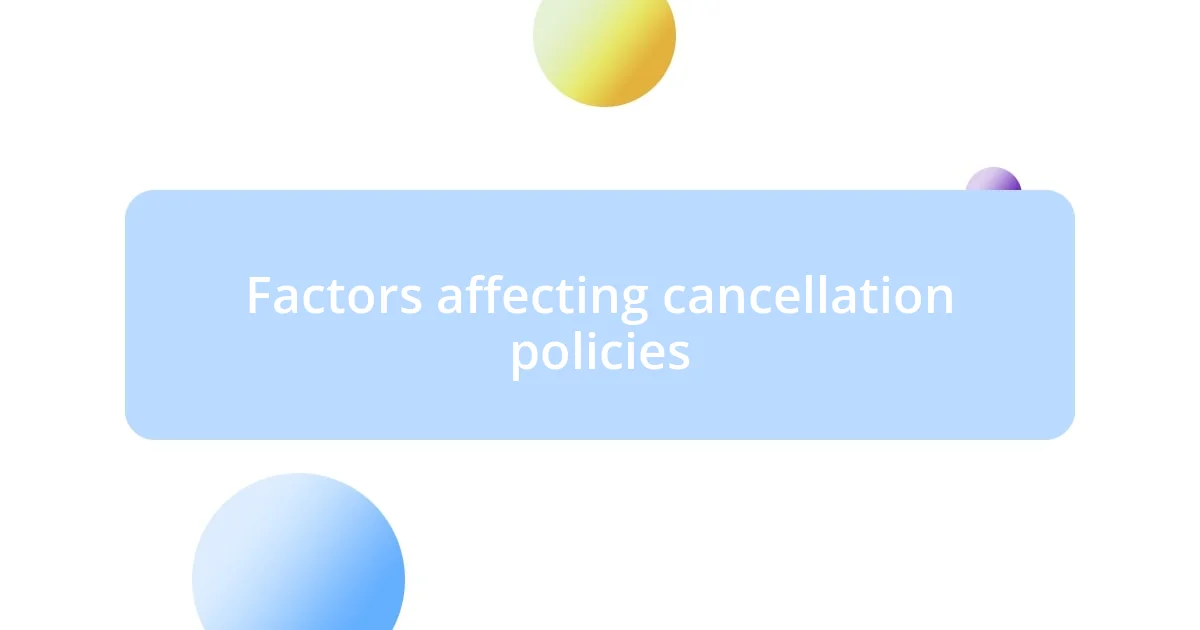
Factors affecting cancellation policies
When it comes to understanding cancellation policies, several factors influence their structure and flexibility. One primary factor is the type of service or product being offered. For example, when I booked a cruise, the cancellation policy was much stricter compared to a local workshop I signed up for. The cruise line likely considered longer lead times and itinerary logistics, while the workshop’s broader time frame allowed for more leniency. It makes you wonder how the nature of the business really shapes the customer experience, doesn’t it?
Another significant aspect is the seasonality of travel or service demand. I once planned a ski trip during peak season, and the cancellation policy was unforgiving. The provider knew that securing full revenue during high demand was critical, so they charged substantial penalties for last-minute cancellations. In a stark contrast, during the off-peak season, I booked a hotel that was more than happy to offer flexibility with cancellations. This difference highlighted for me how businesses adapt their policies based on when they expect to see the most bookings. Have you noticed this pattern as well?
Lastly, customer behavior and established trends also play a pivotal role. For example, companies often analyze how frequently customers cancel and use that data to formulate their policies. I remember booking a flight with an airline that had become notorious for its last-minute changes. Naturally, I was more cautious and overly vigilant in understanding their cancellation terms. This careful consideration had me pondering—how much do our past experiences affect our decisions moving forward? It’s evident to me that our collective behavior nudges providers to adjust their policies, striving for a balance between customer satisfaction and their bottom line.

Tips for managing cancellations
Managing cancellations can be a bit of a tightrope walk, but I’ve learned a few strategies that can help ease the experience. One effective tip is to read the fine print in cancellation policies thoroughly before committing. I vividly remember a time when I skimmed through a policy and ended up stuck with a non-refundable ticket after realizing I couldn’t attend an important event. That moment was such a wake-up call for me, reminding me how crucial it is to know the terms, as they can vary widely and might not align with your needs.
Another strategy is to consider travel insurance. I found myself in a bind once when a sudden illness hit me just days before my trip. Thankfully, I had invested in travel insurance, which allowed me to cancel and recoup my costs. It felt like a safety net during a chaotic time. It makes you wonder, how often do we overlook that safety net until we urgently need it?
Lastly, don’t hesitate to communicate with the provider directly if something shifts in your plans. Once, I was dealing with a last-minute change, and I called the hotel to explain my situation. To my surprise, they were understanding and modified my reservation without any penalties. It made me realize that sometimes, the human element can lead to flexibility that isn’t always spelled out in the fine print. Have you ever reached out like that? You might be surprised by how accommodating companies can be when you openly communicate your circumstances.
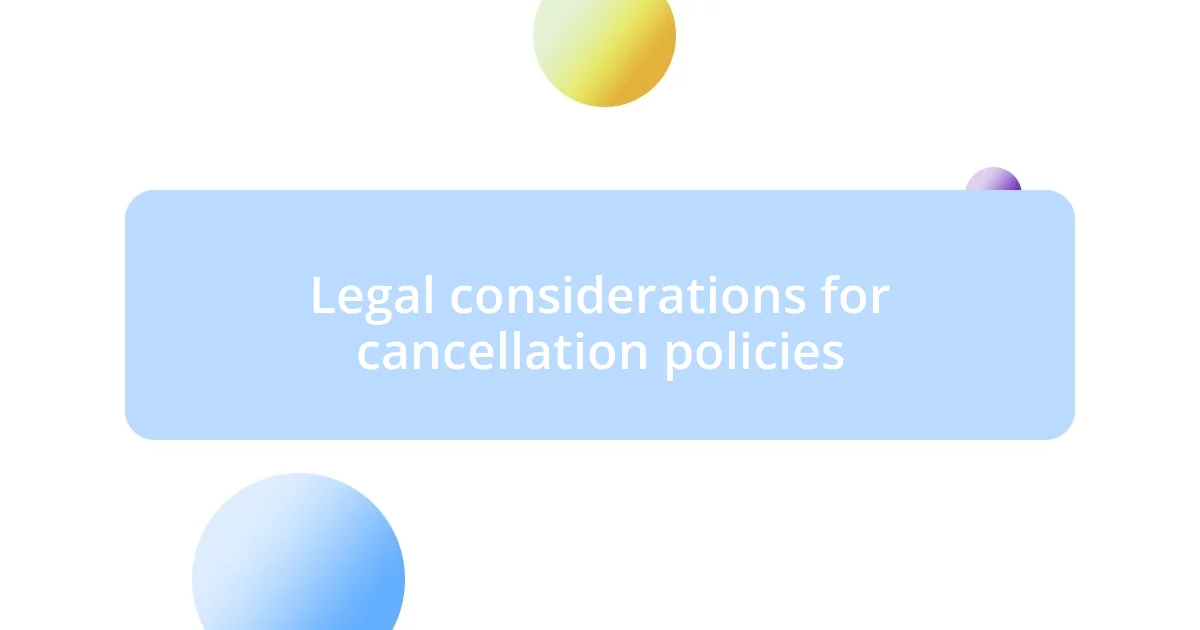
Legal considerations for cancellation policies
When navigating the legal landscape of cancellation policies, it’s vital to consider consumer rights, which can vary significantly by jurisdiction. I recall a situation where I was stung by a surprising clause in an event ticket’s policy, allowing no refunds under any circumstances. This experience underscored for me the importance of understanding local laws, as many places have consumer protection regulations that mandate reasonable cancellation terms. Have you ever felt like the fine print blindsided you?
Additionally, clarity and transparency in policies can significantly affect a business’s legal standing. Once, I encountered a rental agreement that was riddled with legal jargon. It left me confused and second-guessing my decisions. The lack of clear language not only put a strain on my experience but also raised questions about how enforceable the policy might be. It really made me wonder—how clear does a company need to be to protect themselves against potential legal disputes?
Lastly, businesses must be cautious about implementing policies that may seem overly punitive. I remember opting for a gym membership that included a hefty cancellation fee. The gym eventually faced backlash when many members felt the policy was unfair. My experience here taught me that imposing strict rules can backfire, leading to a damaged reputation and potential legal challenges if customers perceive policies as excessive. When crafting cancellation policies, balancing protection for the business while honoring customer rights is a must. What insights have you gathered from your own experiences with cancellation policies?














